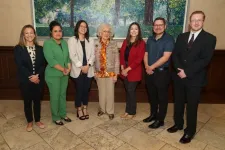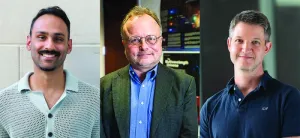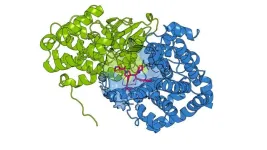(Press-News.org) The 2024 Ramona Jones Friends of BrainHealth Luncheon on September 30, 2024 continued the 25th anniversary celebration of Center for BrainHealth – part of The University of Texas at Dallas – and the second year this annual event has been sponsored by founding Advisory Board member Ramona Jones and her family.
Staged “Shark Tank”-style” at the Dallas Country Club, the event featured a competition between emerging scientists pitching novel research proposals and vying for $20,000 in seed funding. Event co-chair Nikki Kapioltas opened the event, calling attention to a milestone year, including record-breaking luncheon attendance and a fundraising total of $600,000 to support the growth of early-career scientists. “After they complete their study and their findings are published, they can take this and move forward to gain more funding,” Kapioltas explained. “These emerging scientists can change the world.”
Center for BrainHealth Chief Director Sandi Chapman, PhD, welcomed UT Dallas’ newly appointed dean of the School of Behavior and Brain Sciences, cognitive neuroscientist Dr. Adam Woods. Thanking BrainHealth’s volunteer leaders, she asserted “gratitude catapults brain health,” extending special appreciation and birthday wishes to 96-year-old Ramona Jones, in attendance, as “the poster girl for BrainHealth.”
BrainHealth Director of Clinical Research Lori Cook, PhD, CCC-SLP, moderated a panel discussion with research finalists Micaela Andreo (from Dr. Chandramallika Basak’s lab), Tracy Brown (from Dr. Francesca Filbey’s lab), and Ashley Campos (from Dr. Bart Rypma’s lab).
After a live audience Q&A, attendees voted to select Andreo as the recipient of this year’s “Audience Choice” Award for her proposal, Improving the Effectiveness of Cognitive Training in Mild Cognitive Impairment: Social Networks to Improve Cognitive Networks. The pilot study will investigate the impact of social networking on the efficacy of previously developed computerized training for individuals with mild cognitive impairment (MCI). This was Andreo’s second year as a finalist and first award from Friends of BrainHealth.
Audience members also heard project concepts from three predetermined “Visionary New Scientists,” who also expressed gratitude to their respective award sponsors:
Thanks to Beverly and Don Freeman – Dr. Jessica Kraft (from Dr. Kristen Kennedy’s lab) will explore cognitive aging trajectories in a novel longitudinal project, Structural and Functional Metrics of Brain Aging and Cognitive Decline;
Thanks to Lyda Hill Philanthropies – Jessica Ma (from Dr. Bart Rypma’s lab) will study the brain-basis for cognitive deficits in multiple sclerosis using functional magnetic resonance imaging (fMRI) and neuropsychological testing, Flowing in and out of the Brain: Understanding Blood Flow Between Networks as a Predictor of Cognitive Decline in Multiple Sclerosis;
Thanks to Kay and Will Beecherl – Hulon Sherard (from Dr. Bart Rypma’s lab) will seek to identify new biomarkers and treatment approaches in the first whole-brain examination of function with consideration to aging and Alzheimer’s, Exploring the Genesis of Alzheimer’s Disease Using Whole-Brain Metrics.
In closing remarks, event co-chair Sarah Schoellkopf shared the excitement of seeing “so many old and new faces” in the crowd. Celebrating the growing influence of BrainHealth research over the years, Schoellkopf announced the incoming Friends of BrainHealth chairs Pam Busbee and Emilynn Wilson, who will lead the 2025 campaign.
Dedicated to supporting emerging researchers with grants to fund innovative new studies, the donor circle has raised nearly $5 million since its inception, providing more than 50 seedling grants to emerging researchers. Members who join Friends of BrainHealth at any level receive an invitation to attend the annual luncheon and lend their voice to the future of BrainHealth research.
ABOUT CENTER FOR BRAINHEALTHCenter for BrainHealth, part of The University of Texas at Dallas, is a translational research institute committed to enhancing, preserving, and restoring brain health across the lifespan. Major research areas include the use of functional and structural neuroimaging techniques to better understand the neurobiology supporting the continual growth of cognition, well-being and social connections in health and disease. This leading-edge scientific exploration is translated quickly into practical innovations to improve how people think, work and live, empowering people of all ages to thrive and unlock their brain potential. Translational innovations leverage 1) the BrainHealth Index, a proprietary measure that uniquely charts one’s upward (or downward) brain health trajectory whatever their starting level; and 2) Strategic Memory Advanced Reasoning Tactics (SMART™) brain health training, a strategy-based toolkit developed and tested by BrainHealth researchers and other teams over three decades.
END
Friends of BrainHealth donor circle awards coveted grants to fuel innovative research
The 2024 Ramona Jones Friends of BrainHealth Luncheon celebrated the 25th anniversary celebration of Center for BrainHealth and the second year second year the annual event has been sponsored by founding Advisory Board member Ramona Jones and her family.
2024-10-01
ELSE PRESS RELEASES FROM THIS DATE:
Study of infertility, health among women of Mexican heritage funded by $2.2M NIH grant
2024-10-01
Researchers at the University of Arizona Health Sciences and the Instituto Nacional de Salud Pública in Mexico are using a $2.2 million National Institutes of Health grant to explore the link between infertility and long-term health issues among Hispanic women of Mexican heritage.
According to recent research, female infertility is often associated with greater risks of cancer, cardiovascular disease and premature mortality. Hispanic women are up to 70% more likely to experience infertility than white women, yet little is known about their long-term health.
“Hispanics are the largest minority group in the United States, and 60% of Hispanics have Mexican heritage. ...
Airborne plastic chemical levels shock researchers
2024-10-01
A new study documents how Southern Californians are chronically being exposed to toxic airborne chemicals called plasticizers, including one that’s been banned from children’s items and beauty products.
Plasticizers are chemical compounds that make materials more flexible. They are used in a wide variety of products ranging from lunchboxes and shower curtains to garden hoses and upholstery.
“It’s not just for drinking straws and grocery bags,” said David Volz, environmental sciences professor at UC Riverside, ...
DOD awards $9M for snowpack and meltwater research and Arctic training program in Alaska and New England
2024-10-01
The Department of Defense (DOD) has awarded a $9 million contract to the University of Maine for research that will significantly expand efforts to quantify snowpack properties, explore the impact of snowmelt on the surrounding terrestrial environments of Alaska and Maine, and expand training opportunities in polar science.
The project is led by School of Earth and Climate Sciences and Climate Change Institute faculty member Seth Campbell, who will collaborate with more than a dozen other scientists from UMaine and other institutions. The effort builds on a related and existing ...
SETI Institute awards education grant through the STRIDE program
2024-10-01
SETI Institute Awards Education Grant through the STRIDE Program
October 1, 2024, Mountain View, CA – The SETI Institute awarded its first education grant through its Support Technology, Research, Innovation, Development and Education (STRIDE) program. The grant supports a new project called Encountering Stars in an Inflatable Planetarium, which will offer immersive astronomy and astrobiology experiences for elementary and middle school students in low-income areas and high school and adult audiences interested in STEM-related experiences. The program also includes a training workshop for K-12 teachers ...
NYU Historian Jennifer L. Morgan wins 2024 MacArthur “Genius Grant”
2024-10-01
New York University historian Jennifer L. Morgan, whose work focuses on the institutionalization of race-based slavery in early America and the Black Atlantic, has been named a 2024 MacArthur Fellow by the John D. and Catherine T. MacArthur Foundation.
MacArthur Fellows are recipients of the foundation’s “genius grants,” who each receive $800,000 over a five-year period to pursue intellectual, social, and artistic endeavors.
“The 2024 MacArthur Fellows pursue rigorous inquiry with aspiration and purpose,” says MacArthur Fellows Director ...
Research in 4 continents links outdoor air pollution to differences in children’s brains
2024-10-01
Outdoor air pollution from power plants, fires and cars continues to degrade human, animal and environmental health around the globe. New research shows that even pollution levels that are below government air-quality standards are associated with differences in children’s brains.
A University of California, Davis, research team systematically analyzed 40 empirical studies, the majority of which had found that outdoor air pollution is associated with differences in children’s brains. These differences include volumes of white matter, which is associated with ...
UTA physicists explore possibility of life beyond Earth
2024-10-01
Are there planets beyond Earth where humans can live? The answer is maybe, according to a new study from University of Texas at Arlington physicists examining F-type star systems.
Stars fall into seven lettered categories according to their surface temperature. They also differ in other factors including mass, luminosity, and radius. F-types are in the middle of the scale, hotter and more massive than our sun. F-type stars are yellowish white in color and have surface temperatures of more than 10,000 degrees.
A habitable zone (HZ) is the distance from a star at which water could exist on orbiting planets’ surfaces. In the research led by doctoral student Shaan Patel ...
Seeing double: Designing drugs that target “twin” cancer proteins
2024-10-01
LA JOLLA, CA—Some proteins in the human body are easy to block with a drug; they have an obvious spot in their structure where a drug can fit, like a key in a lock. But other proteins are more difficult to target, with no clear drug-binding sites.
To design a drug that blocks a cancer-related protein, Scripps Research scientists took a hint from the protein’s paralog, or “twin.” Using innovative chemical biology methods, the scientists pinpointed a druggable site on the paralog, and then used that knowledge to characterize drugs that bound to a similar—but more difficult to detect—spot on its twin. Ultimately, they found drugs ...
Fierce names Insilico Medicine as one of its Fierce 50 Honorees of 2024
2024-10-01
Cambridge, MA, Sept. 26, 2024 –Insilico Medicine, a clinical-stage generative AI-driven drug discovery company, announced today that Fierce Life Sciences and Fierce Healthcare have named Insilico Medicine as one of 2024’s Fierce 50 honorees. The Fierce 50 showcases 50 individuals and companies driving advancements in medicine, fostering innovation and shaping the future of biopharma and healthcare.
“The annual Fierce 50 special report highlights individuals and companies that are driving progress in the pharmaceutical, healthcare and biotechnology industries,” said Ayla Ellison, Editor-in-Chief of Fierce Life Sciences and Healthcare. “These 50 outstanding ...
Cleveland Clinic researchers build first large-scale atlas of how immune cells react to mutations during cancer immunotherapy
2024-10-01
A Cleveland Clinic-led research collaboration between Timothy Chan, MD, PhD, Chair of Cleveland Clinic’s Global Center for Immunotherapy, and Bristol Myers Squibb has published the most comprehensive overview to date of how the immune system reshapes tumor architecture in response to immune checkpoint therapy.
The eight-year study, published in Nature Medicine, outlines how cancer immunotherapy induces tumor recognition through neoantigens to reshape the tumor ecosystem. Neoantigens are small peptides produced when cancer cells mutate and are a primary marker for the immune system to recognize cancer cells as different ...
LAST 30 PRESS RELEASES:
Magnetic resonance imaging opens the door to better treatments for underdiagnosed atypical Parkinsonisms
National poll finds gaps in community preparedness for teen cardiac emergencies
One strategy to block both drug-resistant bacteria and influenza: new broad-spectrum infection prevention approach validated
Survey: 3 in 4 skip physical therapy homework, stunting progress
College students who spend hours on social media are more likely to be lonely – national US study
Evidence behind intermittent fasting for weight loss fails to match hype
How AI tools like DeepSeek are transforming emotional and mental health care of Chinese youth
Study finds link between sugary drinks and anxiety in young people
Scientists show how to predict world’s deadly scorpion hotspots
ASU researchers to lead AAAS panel on water insecurity in the United States
ASU professor Anne Stone to present at AAAS Conference in Phoenix on ancient origins of modern disease
Proposals for exploring viruses and skin as the next experimental quantum frontiers share US$30,000 science award
ASU researchers showcase scalable tech solutions for older adults living alone with cognitive decline at AAAS 2026
Scientists identify smooth regional trends in fruit fly survival strategies
Antipathy toward snakes? Your parents likely talked you into that at an early age
Sylvester Cancer Tip Sheet for Feb. 2026
Online exposure to medical misinformation concentrated among older adults
Telehealth improves access to genetic services for adult survivors of childhood cancers
Outdated mortality benchmarks risk missing early signs of famine and delay recognizing mass starvation
Newly discovered bacterium converts carbon dioxide into chemicals using electricity
Flipping and reversing mini-proteins could improve disease treatment
Scientists reveal major hidden source of atmospheric nitrogen pollution in fragile lake basin
Biochar emerges as a powerful tool for soil carbon neutrality and climate mitigation
Tiny cell messengers show big promise for safer protein and gene delivery
AMS releases statement regarding the decision to rescind EPA’s 2009 Endangerment Finding
Parents’ alcohol and drug use influences their children’s consumption, research shows
Modular assembly of chiral nitrogen-bridged rings achieved by palladium-catalyzed diastereoselective and enantioselective cascade cyclization reactions
Promoting civic engagement
AMS Science Preview: Hurricane slowdown, school snow days
Deforestation in the Amazon raises the surface temperature by 3 °C during the dry season
[Press-News.org] Friends of BrainHealth donor circle awards coveted grants to fuel innovative researchThe 2024 Ramona Jones Friends of BrainHealth Luncheon celebrated the 25th anniversary celebration of Center for BrainHealth and the second year second year the annual event has been sponsored by founding Advisory Board member Ramona Jones and her family.






